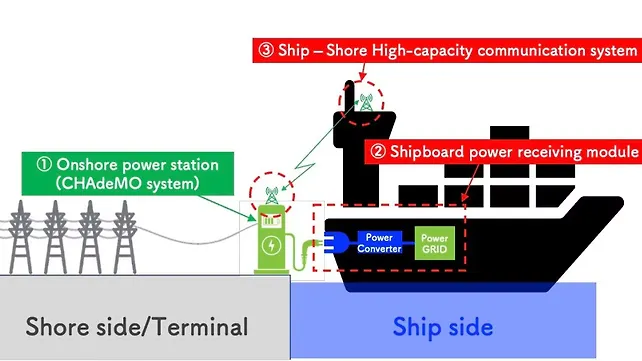
Mitsubishi Shipbuilding has established the 'Promotion Council for Zero Emission Chargers for Ships' to promote the widespread use of standardised shore-to-ship power stations along with other Japanese partners such as e5 Lab Inc., Marindows Inc., e-Mobility Power Inc., CHAdeMO Association, The Japan Ship Technology Research Association and Development Bank of Japan.
Shore-to-ship power supply, which involves supplying electricity from land to ships, is attracting attention as a concrete measure to reduce CO2 emissions. Approximately 40% of CO2 emissions in ports come from diesel generators on docked ships. These generators not only emit CO2 but also emit harmful substances such as 'PM,' 'NOx,' and 'Sox,” in addition to noise.
In line with the Japanese Government's policy and as a world-first initiative involving the member companies, the Council has recognised the effectiveness of zero-emission chargers (onshore power) for ships to promote decarbonisation in maritime and port areas and expand renewable energy use. The Council will take into account the various issues in the ship power supply business in the early stages of EV ship diffusion.
The participating members in an all-Japan collaboration centred on the seven companies aim to develop and maintain a strategic ecosystem for zero emission chargers for ships and to strategically engage in efficient operations and effective utilisation.
This will lead to improved user convenience, an increase in the number of ships using the service, the independence of the ship power supply business, and the further development of chargers.
In the initiative's first phase, by fiscal 2025, the Council will install prototype standardised universal zero emission chargers for ships in Japan’s Hanshin and Keihin Ports, which are international strategic ports where domestic and foreign freight and ships are concentrated. These chargers will then be expanded to ports, fishing ports, and marinas nationwide and overseas.
The Council hopes to achieve several initiatives, including developing a standard universal zero-emission charger system for ships, consisting of three elements and standardised specification that transcends company boundaries. Besides, it will have
(i) Onshore power station (standardised charger and billing system)
(ii) Shipboard power receiving module (standardised and modularised hardware and software)
(iii) High-capacity communication between ship and shore (standardised high-capacity communication system within the port)
Port areas are pivotal in the international supply chain, with over 99% of exported and imported goods passing through them. These areas are also the heart of coastal industrial zones, where power plants, steelworks, chemical industries, and others, responsible for about 60% of Japan’s CO2 emissions, are concentrated. Intensive efforts towards decarbonisation in these port areas are seen as effective and necessary to promote Japan's carbon neutrality by 2050.
Japan declared in October 2020 that it aims to achieve carbon neutrality by 2050 and reduce emissions by 46% by 2030 compared to 2013 levels, and further reduce to 50%.
Also Read:
Demand For Bulk Carriers Drives Ship Repair Market To Grow At 6.5% CAGR Till 2031